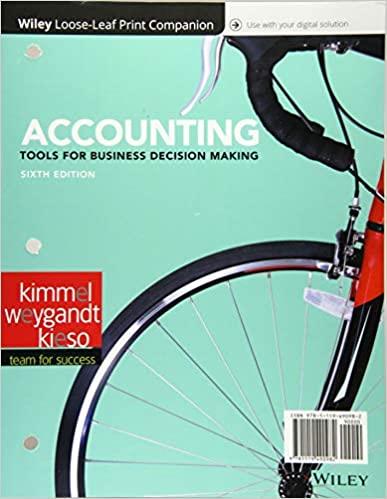Question
10. An analysis of company performance using DuPont analysis Walking down the hall of your office building with a sheaf of papers in his hand,
10. An analysis of company performance using DuPont analysis
Walking down the hall of your office building with a sheaf of papers in his hand, your friend and colleague, Landon, stepped into your office and asked the following.
LANDON: Do you have 10 or 15 minutes that you can spare?
YOU: Sure, Ive got a meeting in an hour, but I dont want to start something new and then be interrupted by the meeting, so how can I help?
LANDON: Ive been reviewing the companys financial statements and looking for general ways to improve our performance, in general, and the companys return on equity, or ROE, in particular. Amelia, my new team leader, suggested that I start by using a DuPont analysis, and Id like to run my numbers and conclusions by you, to see if Ive missed anything.
Here are the balance sheet and income statement data that Amelia gave me, and here are my notes with my calculations. Could you start by making sure that my numbers are correct?
YOU: Give me a minute to look at these financial statements and to remember what I know about the DuPont analysis.
| Balance Sheet Data | Income Statement Data | ||||
|---|---|---|---|---|---|
| Cash | $700,000 | Accounts payable | $840,000 | Sales | $14,000,000 |
| Accounts receivable | 1,400,000 | Accruals | 280,000 | Cost of goods sold | 7,000,000 |
| Inventory | 2,100,000 | Notes payable | 1,120,000 | Gross profit | $7,000,000 |
| Current assets | $4,200,000 | Current liabilities | $2,240,000 | Operating expenses | 3,500,000 |
| Long-term debt | 3,640,000 | EBIT | $3,500,000 | ||
| Total liabilities | $5,880,000 | Interest expense | 571,200 | ||
| Common stock | 980,000 | EBT | $2,928,800 | ||
| Net fixed assets | 5,600,000 | Retained earnings | 2,940,000 | Taxes | 1,025,080 |
| Total equity | $3,920,000 | Net income | $1,903,720 | ||
| Total assets | $9,800,000 | Total debt and equity | $9,800,000 | ||
LANDON: OK, it looks like Ive got a couple of incorrect values, so show me your calculations, and then we can talk strategies for improvement.
YOU: Ive just made rough calculations, so let me complete this table by inputting the components of each ratio and its value:
Question #1: Please provide the answers for the numerators, denominators and value below.
Note: Do not round intermediate calculations. Round final answers to the nearest whole number.
| Hydra Cosmetics Inc. DuPont Analysis | |||||
|---|---|---|---|---|---|
| Calculation | |||||
| Profitability ratios | Numerator | Denominator | Value | ||
| Gross profit margin (%) |
| / |
| = |
|
| Operating profit margin (%) |
| / |
| = |
|
| Net profit margin (%) |
| / |
| = |
|
| Return on equity (%) |
| / |
| = |
|
| Asset management ratio | |||||
| Total asset turnover |
| / |
| = |
|
| Financing ratios | |||||
| Equity multiplier |
| / |
| = |
|
LANDON: I see what I did wrong in my computations. Thanks for reviewing these calculations with me. You saved me from a lot of embarrassment! Amelia would have been very disappointed in me if I had showed her my original work.
So, now lets switch topics and identify general strategies that could be used to positively affect Hydras ROE.
YOU: OK, so given your knowledge of the component ratios used in the DuPont equation, which of the following strategies should improve the companys ROE?
Check all that apply.
Increase the efficiency of its assets so that it generates more sales with each dollar of asset investment and increases the companys total asset turnover.
Use more equity financing in its capital structure, which will increase the equity multiplier.
Decrease the companys use of debt capital because it will decrease the equity multiplier.
Reduce the companys operating expenses, its cost of goods sold, and/or the interest rate on its borrowed funds because this will increase the companys net profit margin.
LANDON: I think I understand now. Thanks for taking the time to go over this with me, and let me know when I can return the favor.
Question #2 Check all that apply.
A. Increase the efficiency of its assets so that it generates more sales with each dollar of asset investment and increases the companys total asset turnover. B. Use more equity financing in its capital structure, which will increase the equity multiplier. C. Decrease the companys use of debt capital because it will decrease the equity multiplier. D. Reduce the companys operating expenses, its cost of goods sold, and/or the interest rate on its borrowed funds because this will increase the companys net profit margin.
Step by Step Solution
There are 3 Steps involved in it
Step: 1

Get Instant Access to Expert-Tailored Solutions
See step-by-step solutions with expert insights and AI powered tools for academic success
Step: 2

Step: 3

Ace Your Homework with AI
Get the answers you need in no time with our AI-driven, step-by-step assistance
Get Started


